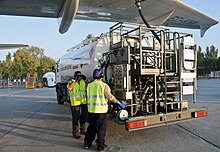Aviation biofuel
sustainable aviation biofuel used to power aircraft
An aviation biofuel (also known as bio-jet fuel[1] or bio-aviation fuel (BAF)[2]) is a biofuel used to power airplanes and other aircraft.

Aviation biofuel can be made from
- plant or animal sources such as Jatropha, algae, tallows, waste oils, palm oil, Babassu, and Camelina
- solid biomass.
- The fuel can be made by an alcohol-to-jet (ATJ) process from waste fermentation
- from synthetic biology
Small piston engines can be changed, so that they use ethanol as fuel.
Synthetic paraffinic kerosene (SPK) is any non-petroleum-based fuel made (or designed) to replace kerosene jet fuel.
Sustainable biofuels are an alternative to electrofuels (or e-fuels).[3] (Related page, Sustainability)
Sustainable aviation fuel (SAF)
changeSustainable aviation fuel (SAF) is certified as being sustainable by a third-party organisation. One such organisation is the Roundtable For Sustainable Biofuels.
(Used cooking oil or) waste cooking-oil can be used to make SAF.
Sources
change- ↑ "Sustainable aviation fuel market demand drives new product launches". Investable Universe. 2020-12-04. Retrieved 2022-12-12. Note: Investable Universe>About
- ↑ Doliente, Stephen S.; et al. (10 July 2020). "Bio-aviation Fuel: A Comprehensive Review and Analysis of the Supply Chain Components" (PDF). Frontiers in Energy Research. 8. doi:10.3389/fenrg.2020.00110.
- ↑ Mark Pilling (2021-03-25). "How sustainable fuel will help power aviation's green revolution". Flight Global.